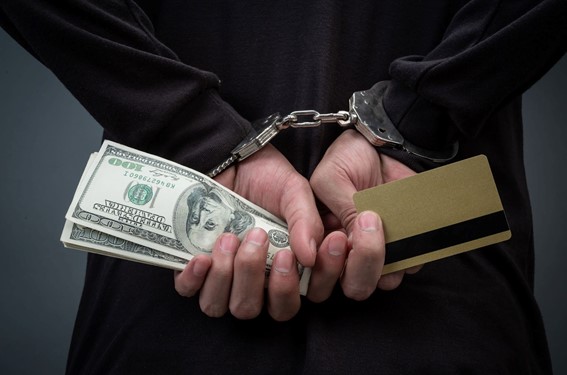In 2024, the range of fraud remains a serious worry, according to new Federal Trade Commission (FTC) data, customers reported an enormous loss of more than $10 billion due to fraud in 2023 alone, a record high and a 14% rise over the previous year.
As the number of fraud cases increases, you might be wondering: Fraud—how many years in jail can fraudsters face? In this post, we will answer that question for different types of fraud and explain how the law handles these crimes to protect you from becoming a victim.
What Is Fraud, and What Are Its Penalties?
Fraud is a crime that involves using dishonest methods to gain an advantage or benefit for oneself. The penalties for committing fraud are serious and increase based on the severity of the offense. In major fraud cases, the consequences can be particularly harsh, often resulting in lengthy prison terms or higher payouts.
Penalties increase with the amount of money involved and the age of the victim. Here are the two types of penalties:
- Minor fraud involving smaller sums is classified as a misdemeanor.
- More serious fraud involving higher sums is classified as a felony.
In the upcoming sections, we will be exploring the different types of fraud, focusing on the legal consequences associated with these fraudulent activities, including a detailed look at potential jail sentences.
How Many Years Can You Face in Jail for Credit Card Fraud
The number of years in jail for credit card fraud can vary, but severe cases can result in up to 15 years in prison, according to federal law 18 U.S.C. § 1029. This depends on whether the crime is classified as a misdemeanor or a felony, which typically depends on the amount of money involved and specific state laws.
Credit card fraud involves various actions such as:
- Stealing card numbers.
- Taking physical cards.
- Opening new cards in someone else’s name.
Due to the diverse nature of these crimes, laws are written broadly to encompass all types of credit card fraud. For smaller amounts, the penalties may be lighter, regularly resulting in shorter jail terms or fines. However, for larger amounts or more severe fraud cases, felony charges could apply, leading to longer prison sentences.
How Many Years Can You Face in Jail for Tax Fraud
Tax fraud is a serious crime with severe penalties. On average, those convicted of tax fraud can expect to spend between 3 and 5 years in jail. The exact duration depends on the severity and specifics of the case.
Two main offenses constitute federal tax crimes:
- Willful Attempt to Evade Tax Assessment: This includes holding assets in another person’s name or transferring assets to hide actual tax liability from the IRS.
- Willful Attempt to Evade Tax Payment: This involves deliberately avoiding the payment of due tax liabilities.
To convict someone of tax fraud, the authorities must prove beyond a reasonable doubt that the accused willfully committed an act to evade or defeat tax assessment or payment and that additional tax is due.
CNMI Cracks Down on Tax Fraud and Evasion with Strict Enforcement Measures
The CNMI Department of Finance and Division of Revenue and Taxation, with the Office of the Attorney General, are cracking down on tax crimes like evasion and fraud. Tax fraud includes not paying owed taxes, not filing returns, underreporting income, and making false claims.
Employers must collect and remit employee taxes, with severe penalties for non-compliance. These actions harm the community, and the government is dedicated to prosecuting offenders. Information on tax fraud can be reported to the authorities.
How Many Years Can You Face in Jail for Insurance Fraud
Insurance fraud faces between 2 and 5 years in state prison. Insurance fraud can result in fines of up to $50,000, and offenders may be granted probation, particularly if they make restitution to the insurance company. Both civil and criminal fines for such fraud can reach up to $250,000 per incident or $500,000 if a corporation is involved.
Here are the key points related to prison sentences for insurance fraud:
- Sentences range between 2 and 5 years in state prison for basic insurance fraud.
- Up to 20 years if bodily injury is involved.
- Up to 5 years per false claim.
How Many Years Can You Face in Jail for Identity Fraud
The penalties for a federal identity fraud conviction under code 18 U.S.C § 1028A vary based on the specifics of the case:
- Up to 15 years in prison for identity theft involving the production or transfer of identification, faking, or possessing equipment to produce documents.
- Up to 20 years in prison if the identity theft is connected to drug trafficking, involves violent crimes, or follows a prior ID theft conviction.
- Up to 30 years in prison if the identity theft is linked to aiding someone or committing a terrorist act.
How Many Years Can You Face in Jail for Mail Fraud
You can go to jail under 18 U.S. Code § 1341, for up to 20 years for mail fraud, as it is a serious federal crime. The exact duration of the prison sentence can vary based on the specifics of the case and the judge’s discretion.
Judges consider various factors including the amount of money involved, the number of victims, the complexity of the scheme, the defendant’s role, and their criminal history. Here are the typical federal sentencing guidelines for mail fraud based on the amount defrauded:
- 0–6 months for frauds under $6,500.
- 1–3 years for frauds ranging from $6,500 to $15,000.
- 3–9 years for fraud schemes involving more than $550,000.
How Many Years Can You Face in Jail for Online Fraud
For online fraud, such as wire fraud, the maximum sentence can be up to 20 years in prison. However, the actual sentence can vary widely depending on specific factors such as the amount defrauded and the defendant’s prior criminal history.
In severe cases, sentences can exceed 20 years; for example, a man was sentenced to 30 years for a major online romance scam. The length of the sentence will depend on the details of each case.
Learn more about romance scams and their techniques.
How Do Federal Wire Fraud Investigations Proceed in Crypto Fraud Cases?
Investment crypto scams were the most prevalent in 2023, causing over $4.6 billion in losses, making them the leading type of fraud detected. This major amount highlights the widespread nature of these frauds and their impact on consumers.
Investment scams surpass other types of fraud by a wide margin, making them the top category of fraudulent activity detected during the year. This fraud typically involves tricking people into investing money with the promise of high returns, only for victims to lose their investments entirely.
How Federal Authorities Investigate Online Fraud
Federal investigations in online fraud cases rely on collecting evidence through two main methods: search warrants and subpoenas.
- Search warrants enable law enforcement to confiscate items such as computers and documents.
- Subpoenas require individuals or entities to provide specific documents or testimony.
Federal agencies like the FBI, USPIS, and USSS follow rigorous protocols to compile a comprehensive case, often requiring the accumulation of extensive evidence:
- These investigations can be prolonged, taking anywhere from several months to multiple years.
- Sometimes, federal authorities collaborate with state or local law enforcement during these investigations.
- The duration of an investigation varies widely, and if insufficient evidence is found, the case may be dropped.
A Popular Case of Crypto Fraud: Sam Bankman-Fried Receives 25-Year Sentence in 2024
Crypto entrepreneur Sam Bankman-Fried was sentenced on May 18, 2024, to 25 years in prison for arranging a massive fraud scheme through his company, FTX, resulting in large financial losses totaling over $11 billion for customers, investors, and lenders.
This decision reflects Kaplan’s concerns about Bankman-Fried’s potential future risks and wants to reduce the possibility of further criminal activities. Throughout his trial, Bankman-Fried’s deceptive practices, including perjury and the misuse of customer funds for personal gain and high-risk investments, were highlighted.
Challenges of Fraud Prevention: Laws and Personal Vigilance
While catching those who commit fraud presents growing challenges, there are strict laws designed to penalize offenders and stop the spread of fraudulent activities. To avoid becoming a victim of fraud, citizens must be effective in controlling their financial security.
Everyone must find new and effective ways to safeguard themselves, report suspicious activities, and support the broader community effort against fraud, taking the necessary steps to be protected by the law.
We Want to Hear From You!
The fight against cryptocurrency scams is a community effort at Crypto Scam Defense Network, and your insights are invaluable. Have you encountered a scam, or do you have questions about navigating the complex world of digital currency? Maybe you have suggestions or want to share your story to help others. Whatever your experience, we’re here to listen and support you.
Reach out to us at hello@cryptoscamdefensenetwork.com. Share your stories, ask questions, or make comments. Your voice is crucial to building a resilient and informed community. Together, we can improve our defenses and promote a safer digital space for all.
Be a part of the change. Your story matters.
Photos via Unsplash







